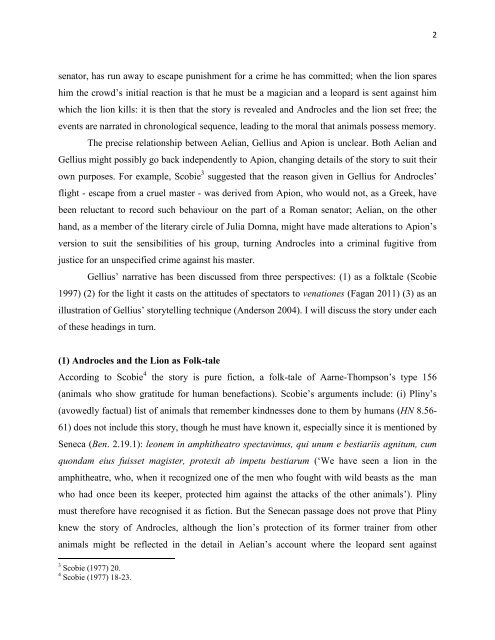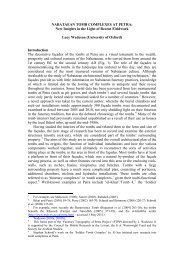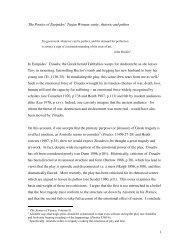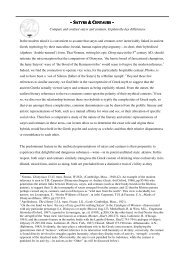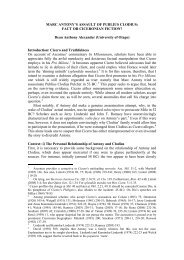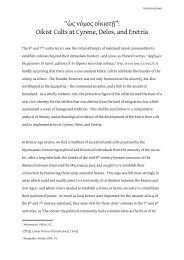'Reality, Paradox and Storytelling in Aulus Gellius' Narrative of ...
'Reality, Paradox and Storytelling in Aulus Gellius' Narrative of ...
'Reality, Paradox and Storytelling in Aulus Gellius' Narrative of ...
Create successful ePaper yourself
Turn your PDF publications into a flip-book with our unique Google optimized e-Paper software.
2<br />
senator, has run away to escape punishment for a crime he has committed; when the lion spares<br />
him the crowd’s <strong>in</strong>itial reaction is that he must be a magician <strong>and</strong> a leopard is sent aga<strong>in</strong>st him<br />
which the lion kills: it is then that the story is revealed <strong>and</strong> Androcles <strong>and</strong> the lion set free; the<br />
events are narrated <strong>in</strong> chronological sequence, lead<strong>in</strong>g to the moral that animals possess memory.<br />
The precise relationship between Aelian, Gellius <strong>and</strong> Apion is unclear. Both Aelian <strong>and</strong><br />
Gellius might possibly go back <strong>in</strong>dependently to Apion, chang<strong>in</strong>g details <strong>of</strong> the story to suit their<br />
own purposes. For example, Scobie 3 suggested that the reason given <strong>in</strong> Gellius for Androcles’<br />
flight - escape from a cruel master - was derived from Apion, who would not, as a Greek, have<br />
been reluctant to record such behaviour on the part <strong>of</strong> a Roman senator; Aelian, on the other<br />
h<strong>and</strong>, as a member <strong>of</strong> the literary circle <strong>of</strong> Julia Domna, might have made alterations to Apion’s<br />
version to suit the sensibilities <strong>of</strong> his group, turn<strong>in</strong>g Androcles <strong>in</strong>to a crim<strong>in</strong>al fugitive from<br />
justice for an unspecified crime aga<strong>in</strong>st his master.<br />
Gellius’ narrative has been discussed from three perspectives: (1) as a folktale (Scobie<br />
1997) (2) for the light it casts on the attitudes <strong>of</strong> spectators to venationes (Fagan 2011) (3) as an<br />
illustration <strong>of</strong> Gellius’ storytell<strong>in</strong>g technique (Anderson 2004). I will discuss the story under each<br />
<strong>of</strong> these head<strong>in</strong>gs <strong>in</strong> turn.<br />
(1) Androcles <strong>and</strong> the Lion as Folk-tale<br />
Accord<strong>in</strong>g to Scobie 4 the story is pure fiction, a folk-tale <strong>of</strong> Aarne-Thompson’s type 156<br />
(animals who show gratitude for human benefactions). Scobie’s arguments <strong>in</strong>clude: (i) Pl<strong>in</strong>y’s<br />
(avowedly factual) list <strong>of</strong> animals that remember k<strong>in</strong>dnesses done to them by humans (HN 8.56-<br />
61) does not <strong>in</strong>clude this story, though he must have known it, especially s<strong>in</strong>ce it is mentioned by<br />
Seneca (Ben. 2.19.1): leonem <strong>in</strong> amphitheatro spectavimus, qui unum e bestiariis agnitum, cum<br />
quondam eius fuisset magister, protexit ab impetu bestiarum (‘We have seen a lion <strong>in</strong> the<br />
amphitheatre, who, when it recognized one <strong>of</strong> the men who fought with wild beasts as the man<br />
who had once been its keeper, protected him aga<strong>in</strong>st the attacks <strong>of</strong> the other animals’). Pl<strong>in</strong>y<br />
must therefore have recognised it as fiction. But the Senecan passage does not prove that Pl<strong>in</strong>y<br />
knew the story <strong>of</strong> Androcles, although the lion’s protection <strong>of</strong> its former tra<strong>in</strong>er from other<br />
animals might be reflected <strong>in</strong> the detail <strong>in</strong> Aelian’s account where the leopard sent aga<strong>in</strong>st<br />
3 Scobie (1977) 20.<br />
4 Scobie (1977) 18-23.


